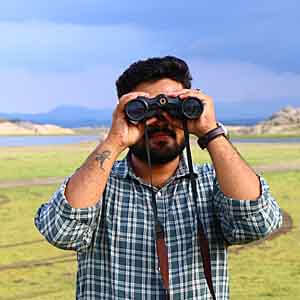What To Do if You Find
a Baby Robin?
You found a baby robin, but now what? Do you pick it up and help it, or leave it where you found it? It can be confusing to know what to do if you find a baby robin, especially when they seem so helpless.
The best thing to do if you find a baby robin is to leave it alone. Unless the baby robin's eyes are still closed or the bird is still featherless, it usually will not need help. In most cases, it is a fledgling, and interference may result in more harm than good.
In the rest of this article, I’ll explain what to do if you find a baby robin based on its age. I’ll also explain how to help a sick or injured robin and how to help an abandoned robin egg hatch.

Determine the Age of the Baby Robin: Hatchling, Nestling, or Fledgling
The first thing you should do when you find a baby robin on the ground is to determine its age.
- Hatchlings: There are newborn robins with closed eyes and no feathers.
- Nestlings: These are slightly older than hatchlings (typically 2-3 days old). Nestlings have a few sprouted feathers, and their eyes are partially opened.
- Fledglings: These are older than hatchlings and nestlings. Their eyes are fully open, and they have a complete set of feathers. However, fledglings cannot fly and will probably be hopping around on the ground, trying to find food and learning how to fly.
What To Do if You Find a Robin Hatchling?
As they are newborns, hatchlings are generally helpless. They can't fend for themselves and, if left on the ground, will probably die.
If you find a robin hatchling, the best thing to do is to place it back in its nest if you can locate it. Make sure to use clean hands or gloves when handling the hatchling. If the nest is inaccessible or destroyed, create a makeshift nest using a garden basket or small container lined with a soft cloth or grass and place it in a nearby tree.
Keep an eye out for the parents and on the hatchling in case of any signs of distress. If the parents don't return after several hours, or the hatchling shows apparent signs of distress, take it to the nearest wildlife rehabilitator for proper care.
However, before the local wildlife rehabilitator arrives, you can do the following to ensure the juvenile robin is safe and comfortable:
- Place the bird in a closed container lined with soft bedding.
- Place a hot water bottle or a heater under the soft cloth. Make sure the heater is on low.
- Keep the box in a quiet, dark place while waiting for the rehabilitator to arrive.
An important note to remember is to avoid giving the baby robin any food, as improper feeding could harm the baby bird more.

Robins (and their babies) are fascinating! So much so that I wrote an article dedicated to giving you all the facts about Robins and their babies. Be sure to check it out!
What Do You Do if You Find a Robin Nestling?
Despite being slightly older than hatchlings and able to move around a bit more, nestlings still depend on their parents for food and survival. They are still vulnerable to weather conditions and have no defense against predators.
If you find a nestling on the ground, check for any nearby nests and try to place it back. If this isn't possible, create a makeshift nest like what was described above for hatchlings.
Keep an eye on the nestling to see if the parents come back. If the parents aren't back after several hours, then contact or take the baby robin to the nearest wildlife rehabilitator.
Use the same process outlined for caring for robin hatchlings to ensure the nestling is safe before the rehabilitator arrives.
What To Do if You Find a Robin Fledgling?
Fledglings are what most people find. They are fully feathered, with open eyes, and hopping around on the ground, trying to learn how to fly.
Fledglings can look like they need help, but most people don't realize that their parents are usually nearby. In most cases, it's best to leave robin fledglings alone. They are learning to fly and becoming independent, and human interference may do more harm than good. Placing them in the nest could result in them falling off again, which could lead to injury.
If the fledgling is in an unsafe location, like on a busy road, carefully move it to a nearby bush or tree.

Who doesn't want more Robins in their yard?? This helpful article of mine enlightens on How To Attract Robins To Your Garden Or Yard.
What To Do if You Find a Sick or Injured Baby Robin?
If you notice the baby robin is sick or injured, the best thing to do is contact a wildlife rehabilitator immediately for assistance.
As you wait for the wildlife rehabilitator, try to keep the bird warm and in a quiet place.
Don’t feed the bird, as improper feeding could do more harm. Remember, you should always handle wild animals with caution and care.
What To Do if You Find a Robin Egg on the Ground?
The first thing to do if you find a robin egg on the ground on the ground is to look for a nest, return the egg, and watch out to see if the parents return. If the parents don't return after several hours, then you can take steps to ensure the egg hatches successfully.
Should you find one of these distinctive blue eggs on the ground, follow these steps to help it hatch:
- Look to ensure the egg hasn’t cracked.
- Verify the egg is still warm and requires incubation. If the egg is cold, then, unfortunately, it is no longer viable.
- Wrap it in a dry paper towel and place it in a nearby container with a heating source, such as a 40-watt light bulb placed above the container. This will keep the egg warm until it hatches.
- Ensure to constantly turn the egg every half an hour to prevent overheating.
- After two weeks, the robin egg should hatch.

There's a lot to like about Robin eggs other than their beautiful blue/green color. I wrote an a fascinating article which tells you all you need to know about Robin eggs...no yolk!
What
To Do If You Find A Baby Robin?...
Conclusion
Now you know exactly what to do if you find a baby robin. While you may be excited about caring for it, the best thing is to either return it to the nest if it's a hatchling or nestling or leave it alone if it's a fledgling.
Contact a wildlife rehabilitator for assistance if the bird is sick or injured. And if you find an egg on the ground, try to return it to its nest and watch for the parents' return.
In any case, remember to handle wild animals with caution and care.
Back To The TOP Of This What To Do If You Find A Baby
Robin Page

About the Author...
Richard Worden, a dedicated bird lover for over 20 years, I love to share my in-depth knowledge and passion for birds. Read more About Me and my expertise in this field.
- We Know Birds HOME ›
- Robin Facts and Information ›
- What To Do if You Find a Baby Robin?
